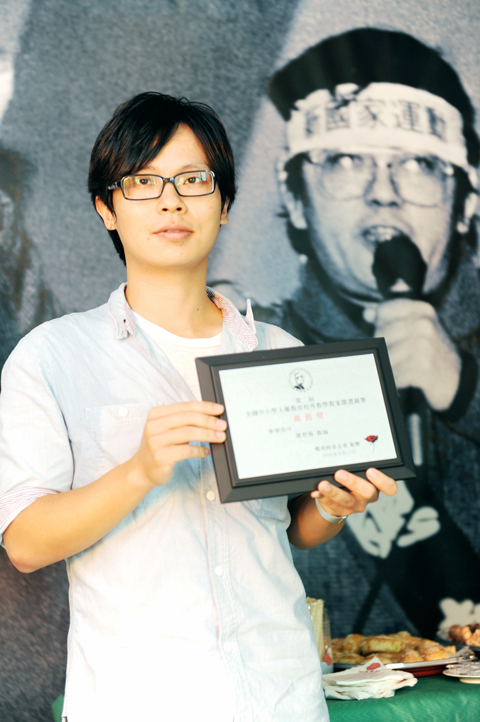|
Teachers create human rights lessons for
contest
RAISING AWARENESS: Organizers of the event hope that educating children about
farmers’ and women’s struggles will protect Taiwan’s democracy in the future
Loa Iok-sin
STAFF REPORTER
Monday, Sep 13, 2010, Page 3

Liao Che-chiang, a teacher at Mailiao Senior
High School in Yunlin County, holds up the plaque he was given along with
NT$50,000 after winning first place for his work on the farmers rights movement
in Taiwan in a competition organized by the Deng Liberty Foundation to promote
human rights education in elementary, junior and senior high schools.
PHOTO: CHANG CHIA-MING, TAIPEI TIMES
About 40 teachers who created human rights education curricula for a contest to
promote human rights content in schools were honored at a ceremony yesterday.
“Through my curriculum, I want students to realize how farmers have always been
the disadvantaged group and have always been exploited,” said Liao Che-chiang
(廖哲強), a teacher at Mailiao High School in Mailiao Township (麥寮), Yunlin Conty,
whose model won “the most recommended curriculum” award in the contest organized
by the Deng Liberty Foundation.
In his curriculum, students would be taught about the Erlin Incident of the
1920s and the ongoing campaign against a science park expansion project in
Changhua County’s Erlin Township (二林). They would also be taken on a trip to the
locations where these events happened, as part of efforts to link the
abstraction of human rights with actual, physical places.
In 1935, Erlin sugarcane farmers, who said they were being exploited by large
corporate sugar mills, refused to sell their produce unless the sugar mills
would negotiate prices with farmers and allow farmers to oversee the weighing
process. Sugar mills turned down the request and, with help from police,
attempted to harvest the sugarcane by force. The move triggered physical
confrontations between farmers and police officers, and many people were wounded
and hundreds of farmers were arrested.
Erlin farmers are once again protesting against the government’s takeover of
their land, this time to make way for the Erlin campus of the Central Taiwan
Science Park.
“It’s so interesting that, despite an 80 year difference, farmers from the same
area are again facing exploitation, though this time in a different way,” Liao
said.
Meanwhile, three teachers from Ganghe Elementary School in Kaohsiung City won an
award for a curriculum design that seeks to make students rethink women’s status
in society.
According to their curriculum, students would head for the Female Laborers
Memorial Park — formerly known as the Cemetery of 25 Ladies — in Kaohsiung.
Twenty-five unmarried female workers, who died when a ferry carrying them to
work sank in Kaohisung Harbor in 1973, are buried there.
According to tradition, women can only be properly worshiped after death and as
members of their husbands’ families. For unmarried women, they can only be sent
to temples or collective cemeteries for women, but not as members of their
biological families.
Believing that the Cemetery of 25 Ladies was disrespectful to women who made
important contributions to their families and the nation’s economic development,
Kaohsiung Mayor Chen Chu (陳菊) renamed the area Female Laborers’ Memorial Park in
2008.
“I think this practice is so not fair and discriminatory to women, and I think
it’s better to remember them as workers who died in an accident on their way to
work,” said Liu Yu-hao (劉育豪), a teacher at Ganghe Elementary School who
initiated the curriculum design. “By bringing up the issue in class, we’d like
to make students think more about women’s status in society.”
However, Liu said some parents might object to the curriculum, since he and his
colleagues not only sought to challenge traditional practices, but were also
taking students to a cemetery.
“A lot of controversial political issues occurr in Taiwan because people do not
learn enough about protection of human rights at school,” Lee Min-yung (李敏勇), a
poet and a member on the foundation’s board of directors, said at the ceremony.
“To strengthen democracy in Taiwan, we must educate our children about
protecting human rights and freedom, instead of making economic development the
sole goal of the country.”
Ronald Tsao (曹欽榮), another board director, said that when people are aware
enough of human rights issues, “they will know what to do when a democratically
elected government goes astray.”
|
![]()
![]()
![]()